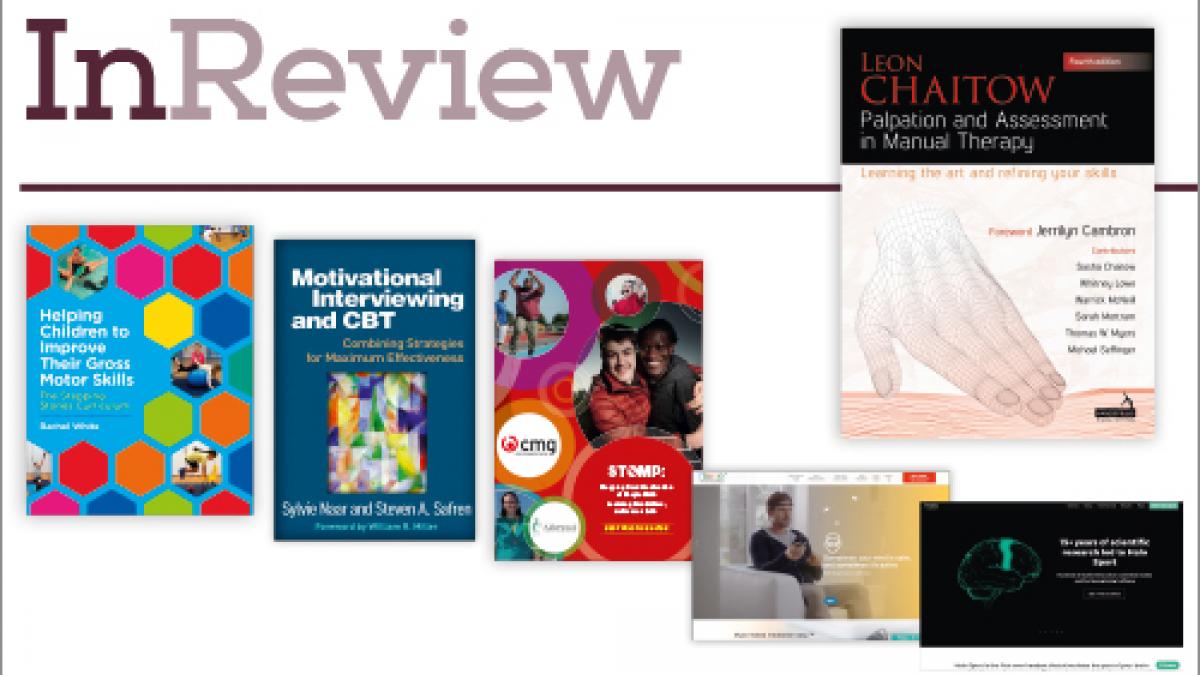Our featured item 'Palpation and Assessment in Manual Therapy' makes interesting reading and we reference 'Helping Children to Improve their Gross Motor Skills'

Palpation and Assessment in Manual Therapy (4th edition) Leon Chaitow ISBN: 9781909141346
Leon Chaitow, an osteopath, naturopath and acupuncturist, is the author of more than 70 books and the editor of the Journal of Bodywork and Movement Therapies. This book is a guide for therapists who use manual therapy for assessment and treatment, with the aim of improving and enhancing their palpation skills. This more evidence-based edition includes more references and a useful chapter on palpation reliability and validity, including a review of commonly used diagnostic tests.
Chapters are divided into palpation of different structures, such as muscle, skin and fascia; some chapters are written by leading experts in their field, such as Thomas Myers. There are special sections in the book between chapters which focus on topics such as percussion palpation, joint play and palpation in patients with fibromyalgia. The final chapter on palpation and emotional states is an interesting read but some of the topics such as subtle palpation might be more relevant to osteopaths and other alternative medicine practitioners.
This book would be a useful resource when planning in-service training to any level of physiotherapist and also a useful manual for students. There are exercises throughout the book that you can practise with colleagues to help improve your palpation skills. Each exercise has a guide to how long the exercise will take and encourages the therapist to record and reflect on their findings. The diagrams in the book are helpful with regard to placement of the hands and the direction of palpation. Some of the exercises are very simple, for example practising palpating a human hair through a page of a telephone directory.
Although there has been considerable debate amongst our profession about hands off versus hands on therapy as treatment, it remains one of the core physiotherapy skills and is an essential tool for assessment. I think this book might inspire some therapists to take another look at palpation and revisit and refine their skills.
Helen Oakes, extended scope practitioner
Helping Children to Improve their Gross Motor Skills: The stepping stones curriculum Rachel White ISBN: 9781785922794
This book offers guidance on helping children with motor coordination difficulties to develop their gross motor skills in a fun way with this guided programme for children and young people aged from five to 18.
Motivational Interviewing and CBT: Combining strategies for maximum effectiveness Sylvie Naar and Steven A Safren ISBN 9781462531547
This book aims to show how integrating motivational interviewing and cognitive-behavioral therapy (CBT) boost client motivation and can lead to better client outcomes than using either approach on its own.
Choose Muse
The makers of Muse claim it is a ‘brain seeing’ headband. The device is backed up by a ‘professionals programme’, which is designed to offer health practitioners an innovative way to introduce meditation into their practice.
According to the Muse website, the tool ‘offers real-time feedback that helps individuals start meditating and quantifiable results that motivate them to continue practising’.
Halo Sport
The Halo Sport headset claims to be the first neuro-stimulation device designed to ‘accelerate gains from physical training’. The website says Halo Sport can be worn before any physical activity – from lifting weights to playing an instrument – to help the brain learn to control and activate the muscles needed. ‘When paired with physical training, Halo Sport has been shown to accelerate gains in strength, explosiveness, endurance, and muscle memory.’
STOMP Best Practice Guide
Care Management Group, which supplies care and support to people with learning disabilities, has produced ‘best-practice’ guidance linked to an NHS England campaign, which is known as STOMP: Stopping over-medication of people with learning disabilities, autism or both.
Number of subscribers: 2




































